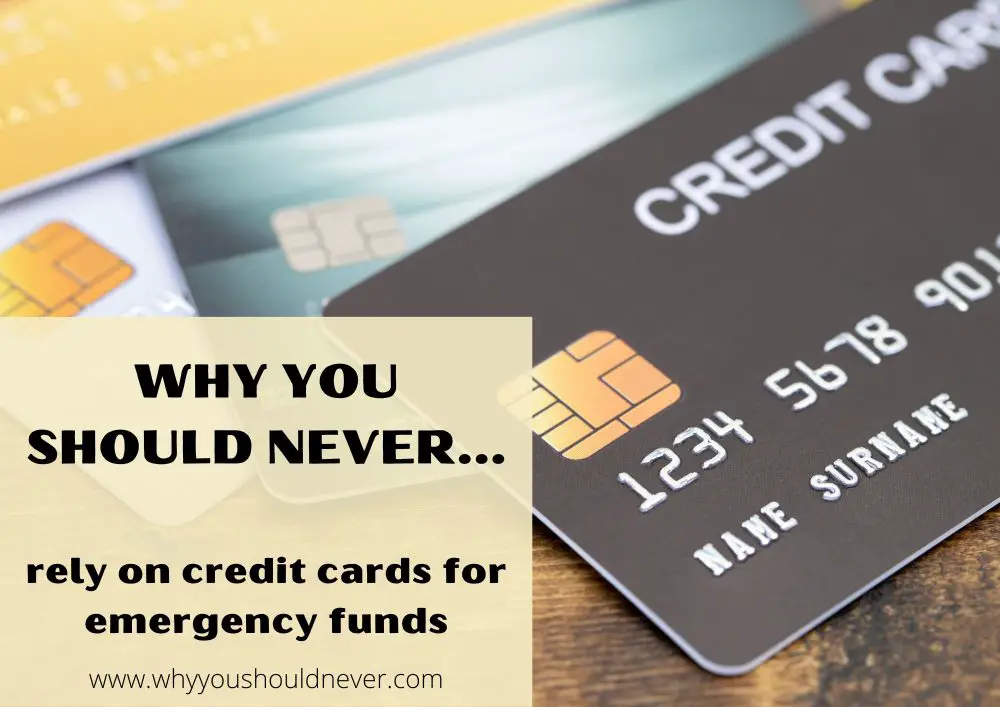![]()
Why You Should Never Rely On Credit Cards For Emergency Funds
Emergencies happen, and they always seem to pop up at the most inconvenient times. From unexpected car repairs to medical bills, life is about as unpredictable as it gets. And with that unpredictability often comes financial stress.
It’s said that the best way to prepare for emergencies is to have a savings account, but according to a recent survey by Bankrate, a staggering 50% of Americans don’t have any emergency savings at all!
So what do people do when the unexpected happens and there’s no financial cushion to fall back on? Why, they turn to credit cards, of course. You know, those devious little plastic rectangles we all carry around that make us feel like we have unlimited purchasing power at our fingertips.
Indeed, credit cards can be lifesavers. I won’t dispute that. But they’re also demonic! Harsh words, I know, but they’re justified. Let’s take a look at why.
7 reasons why you shouldn’t rely on credit cards for emergency funds
1. Interest rates can be sky-high
Even if you have good credit, the interest rates on credit cards can skyrocket when it comes to cash advances and emergency purchases. This means that when you use your card for emergencies, you could end up paying an arm and a leg in interest charges.
2. Credit limits might not cover all costs
Depending on the severity of the emergency, your credit limit may not cover all necessary expenses. In such cases, you’ll either need to find another way to come up with funds or risk going into debt by maxing out your credit card.
3. It’s easy to overspend
That high credit limit is way too tempting, we both know it. Sure, you might start off using your card to cover some emergency expense, but there’s no guarantee that the spending will stop there.
Using a credit card at any time is like opening the floodgates: once you start spending, it’s difficult to stop. And what started out as a one-off emergency payment could soon become a shopping spree.
4. Your credit score could take a hit
High credit utilization rates and missed payments will hurt your credit score, which will make it harder to secure loans or lines of credit in the future. This means that relying on credit cards for emergencies could actually hurt your long-term financial stability.
5. Fees can pile up
Beyond high interest rates, many credit cards also have additional fees such as cash advance fees and balance transfer fees. The former is something you especially need to watch out for if you’re someone who likes to use their credit card to withdraw cash.
These fees can and do add up quickly, leaving you with even less money than when you started.
6. They don’t teach good financial habits
By relying on credit cards for emergencies, you’re not learning how to build a solid emergency fund or budget effectively. Without these skills, you’ll be more likely to find yourself in the same emergency situations over and over again.
7. It’s a temporary solution
Perhaps the biggest problem with relying on credit cards for emergencies is that it’s only a temporary fix. Unless you’re able to quickly pay off your balance or find another way to come up with funds, you’ll be facing the same financial stress and uncertainty as before.
There may be other options available that won’t put you in debt
Credit cards aren’t the only option when it comes to emergency funds. There are plenty of non-credit options you should consider, such as:
- Selling unused items around your home to generate some quick cash
- Picking up extra work through freelance gigs or part-time jobs while building up an emergency fund
- Applying for government assistance programs or searching for local non-profits that can offer financial aid during emergencies
- Relying on your support system, such as family or friends, for help
The truth is that any one of these solutions may be better than using your credit card in an emergency. Take the time to evaluate all options and make sure you’re making the best decision for yourself and your financial situation.
Some parting advice: Build an emergency fund! This might seem like common-sense, but many people simply don’t know where to start when it comes to building up savings.
Here are some quick tips:
- Set a goal for how much you want to save, and start small. Even saving $5 or $10 per week adds up over time
- Designate a separate savings account specifically for emergencies, so that you’re not tempted to dip into it for non-emergency purposes
- Take advantage of automatic savings programs offered by many banks and credit unions. These sorts of tools make it easy to squirrel away money without even thinking about it
- Consider putting your emergency fund in a high-yield savings account rather than just any old checking or savings account. This will allow your money to earn interest over time
Remember that building an emergency fund isn’t something that happens overnight – it takes discipline and effort. But the peace of mind you’ll have when you’ve built up enough savings to cover unexpected expenses is priceless.
And if you absolutely must use a credit card for emergencies, make sure you have a clear plan in place to pay off the balance as soon as possible. Don’t fall into the trap of only making minimum monthly payments – that will simply prolong your debt and cause interest charges to accumulate.
